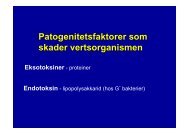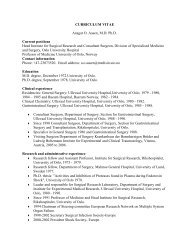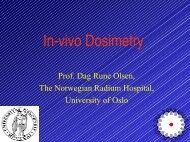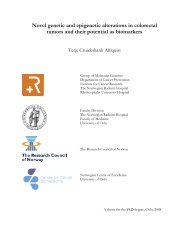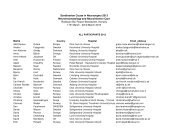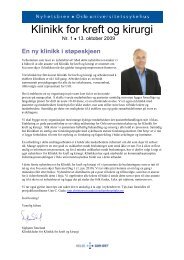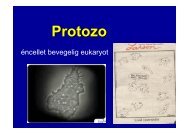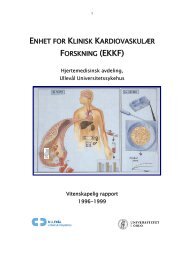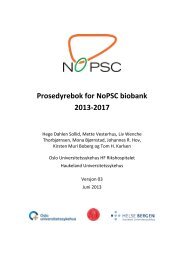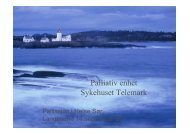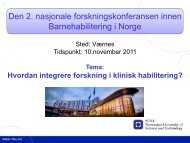Preface - Ous-research.no
Preface - Ous-research.no
Preface - Ous-research.no
Create successful ePaper yourself
Turn your PDF publications into a flip-book with our unique Google optimized e-Paper software.
Cyclic AMP signalling in inflammation and sepsis<br />
Principal Investigator<br />
Petter Kirkeby Risøe, Cand.med. (UiO)<br />
Supervisor<br />
Maria K. Dahle, MSc, PhD (UiO)<br />
Guro Valen, Professor, MD, PhD (UiO)<br />
Håvard Attramadal, Professor, MD, PhD (OUH/UiO)<br />
Aim<br />
Investigate the role and regulation of the intracellular cyclic AMP signalling system in<br />
innate immune cells, with a particular focus on cAMP-producing adenylyl cyclases.<br />
Background<br />
As a former member of the Group for Surgical Intensive Care Medicine, these projects are rooted in the field of innate immune responses<br />
and sepsis. The intracellular second messenger cyclic AMP (cAMP) acts as a negative regulator of proinflammatory cytokine release<br />
from macrophages, leukocyte adhesion, T-cell signaling, cytotoxic responses, endothelial disruption and cytokine-mediated signaling<br />
events. By utilizing ten different isoforms of cAMP synthesizing adenylyl cyclases (ACs) and an even larger family of cAMP hydrolyzing<br />
phosphodiesterases (PDEs) organized in subcellular microdomains, the cAMP signaling system can mediate a multitude of cellular<br />
effects. Circulating levels of cAMP have been found to be diminished in septic patients, and in animal models of systemic inflammation<br />
and endotoxic shock, elevating cAMP by inhibition of PDE4-isoforms has been reported to protect organ function and reduce<br />
fatalities.<br />
Projects 2010<br />
Previous studies initiated by Maria K. Dahle have demonstrated an isoform-specific AC attenuation in organs from endotoxemic rats, as<br />
well as in rat Kupffer cells and alveolar macrophage populations. In 2010, we continued work on a study of lipopolysaccharide-mediated<br />
AC regulation in human blood, which revealed differential regulation of the isozymes in a gender-specific manner. Preliminary results<br />
were presented at the 5th International Congress on Gender Medicine in December. We also collected blood samples for further<br />
molecular study of innate immune function in chronic inflammation in cooperation with Diakonhjemmet Sykehus, as part of a larger<br />
clinical trial (the RORA Study). Lastly, we finalized a manuscript on AC regulation in rats undergoing the cecal ligation and puncture<br />
(CLP) procedure, which support previous published data on AC attenuation in the context of cataclysmic systemic inflammation. The<br />
manuscript also demonstrates an increase in the micro-RNA miR-142-3p among CLP rats, which correlated with the downregulation of<br />
a specific AC-isoform (AC9) suspected to be key player in inflammation:<br />
Cecal ligation and puncture sepsis is associated with attenuated expression of adenylyl cyclase 9 and increases in miR-142-3p<br />
Risøe PK*, Ryg U*, Wang YY, Smedsrød B, Christoffersen T, Dahle MK.<br />
External support<br />
These projects are greatly indebted to the gratuitous financial support of Norske Kvinners Sanitetsforening, as well as the benefaction<br />
of the Institute for Basic Medical Sciences by the provision of laboratory facilities and first-rate scientific assistance.<br />
55



